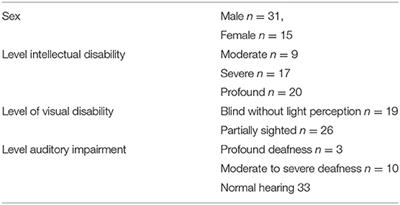EDITORIAL
Published on 09 Dec 2021
Editorial: Development, Wellbeing, and Lifelong Learning in Individuals With a Dual Sensory Loss
doi 10.3389/fpsyg.2021.790549
- 1,906 views
- 4 citations
17k
Total downloads
115k
Total views and downloads
EDITORIAL
Published on 09 Dec 2021
ORIGINAL RESEARCH
Published on 25 Feb 2021

ORIGINAL RESEARCH
Published on 14 Dec 2020

ORIGINAL RESEARCH
Published on 11 Dec 2020

ORIGINAL RESEARCH
Published on 10 Dec 2020

ORIGINAL RESEARCH
Published on 03 Dec 2020

ORIGINAL RESEARCH
Published on 27 Nov 2020

CLINICAL TRIAL
Published on 26 Nov 2020

ORIGINAL RESEARCH
Published on 30 Oct 2020

HYPOTHESIS AND THEORY
Published on 30 Oct 2020
BRIEF RESEARCH REPORT
Published on 28 Oct 2020

ORIGINAL RESEARCH
Published on 26 Oct 2020

